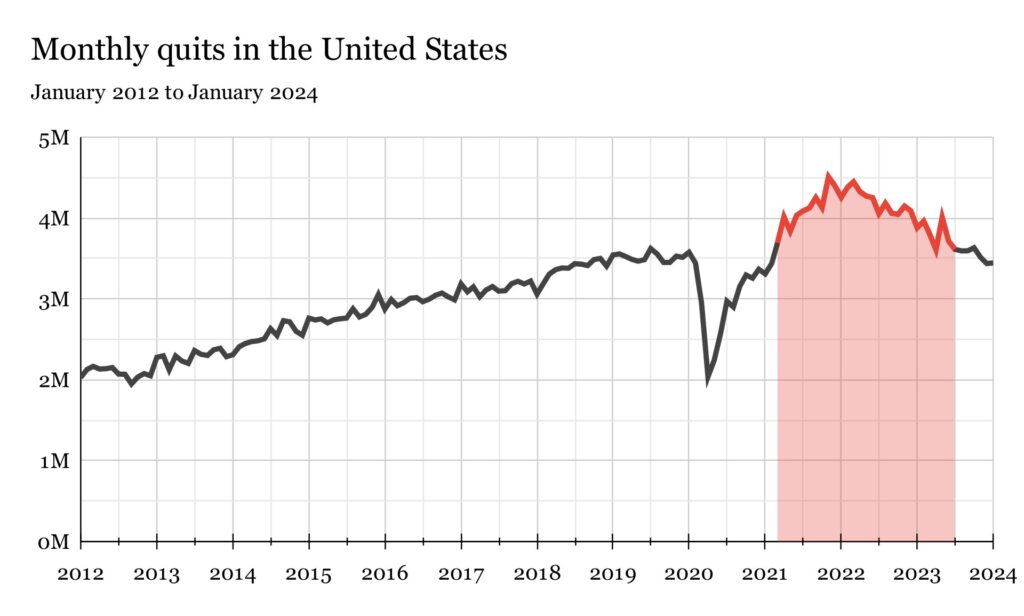The aftermath of the pandemic has unleashed unprecedented shifts in the workforce landscape, leading to what some have termed the “turnover tsunami.” The Economic Policy Institute reported a record high of 4.5M resignations per month near the end of 2021, not dropping back to pre-pandemic numbers until the end of 2023, calling it the Great Resignation. The most common reasons cited for quitting over that period were wage stagnation, cost of living, limited advancement, hostile work environment, lack of benefits, and inflexible remote-work policies.

With remote work becoming the new norm, retaining talent has become more challenging than ever, exacerbating the importance of culture within organizations. Raybourn Group International’s Kim Paugh, CAE, Nick Estrada, CAE, CMP, and Mark McSweeney, CAE, had an opportunity to present to a group of peers within the association management space on this topic during the AMCs Engaged conference in Montreal.
RGI, a four-time recipient of Indiana’s Best Places to Work, offered case studies illustrating how intentional approaches to employee retention can achieve a thriving workplace culture through strategic hiring and onboarding processes, robust feedback structures, and comprehensive growth plans for staff.
Strategic Hiring
Improved retention begins with a successful hiring process. There are four common pitfalls to avoid:
1. Candidates have unrealistic expectations of the job.
Start with regularly reviewing and updating job descriptions to ensure they reflect current-day requirements (physical, travel, etc.), work environment (in-office, remote, hybrid), and a clear picture of responsibilities. The realities of any given job can change from year to year, so ensure you are clear on the job you need to fill. Similarly, the interview process should be intentional (the number of interviews, who is involved in each round, the purpose of each round, etc.) and should reinforce expectations and company culture.
2. Personality drives your hiring decisions.
Extroverts often win the interview game. If possible, use two or three people with different personality types in each interview to ensure you’re getting balanced perspectives. While personality is important, don’t let it overshadow legitimate background and education (formal or experience). RGI additionally uses objective tools such as DiSC, PXT, and skills testing in its later interview rounds.
3. Lack of clarity around what it takes to be successful.
Similar to a realistic job description, be clear on what it takes to succeed, not just in the job itself, but within your company culture. If qualities like a thirst for continual development, ability to learn quickly, independence and self-motivation, resilience, and time management skills are important, be intentional about that.
4. Overlooking potential in search of perfection.
Differentiate between must-have skills and nice-to-have skills. What can you train and what can you not train? No one is perfect, so don’t let the search for the perfect fit become paralyzing. Give candidates with alternate backgrounds a chance to show how their skills transfer.
Feedback and Culture
A Salesforce research study reports an employee is 4.6 times more likely to feel empowered to perform to the best of their ability when that employee feels heard. Truly listening allows employees to experience mutual personal growth, create a stronger sense of belonging at the company, and provide clearer direction for policy and growth discussions.
RGI offers several opportunities for team members to provide formal and informal input and feedback:
- This includes topical pulse surveys throughout the year, the annual Best Places to Work survey, and confidential exit surveys. The data received is analyzed by the company president and senior leadership. Often, policies and work processes are updated (or even created) as a direct result.
- 1:1s. All supervisors meet individually at least monthly with their direct reports. The agenda is driven by the staff member and can range from personal/family updates to task or resource challenges to professional development or career advancement interests.
- Listening sessions. In response to staff struggling to find an appropriate place to provide direct feedback other than to their supervisor or the president, listening sessions confidentially pair senior-level management with staff not under their direct or indirect supervision to provide a safe environment for staff to share concerns or challenges.
Modifying policies around remote working is an example of feedback impacting culture…and ultimately improving retention. For many organizations, including RGI, working remotely used to be the exception to the rule. Today, working remotely – whether fully or hybrid – is commonplace, if not expected. Forbes Advisor reports approximately 22% of the US workforce will be fully remote by 2025, while approximately 98% of workers desire to work remotely on at least a hybrid basis. With some level of remote work becoming the new norm, listening to employees and finding alignment between their expectations and business needs will be imperative.
Intentional Professional Development
Even in small team environments, being intentional about creating growth opportunities and purposeful about preparing staff for when those opportunities arise is key to retention. At RGI, creating an environment that encourages professional excellence is one of the company’s core values. Actively listening and taking employee input to heart goes a long way toward identifying where those professional development opportunities exist.
Local societies of association executives, ASAE, and MPI are excellent external sources for association-related development. Additionally, whether you have a staff of five or a staff of fifty-five, you have cumulative knowledge and expertise within the walls of your own organization. Take advantage of that. While you don’t want to ignore the benefits of an external perspective, the value of sharing the knowledge and expertise of your own staff can be priceless.
Does professional development guarantee job advancement? No. Ultimately, business needs and capacity typically dictate staff movement. However, as an organization grows or its needs change, opportunities often present themselves. It’s advantageous for employees to be prepared when those opportunities arise.
Do employees take advantage of professional development and leave? Sometimes they do. But as Henry Ford famously said long ago, “The only thing worse than training your employees and having them leave is not training them and having them stay!”
English business magnate Richard Branson has a similar philosophy that sums up RGI’s intentionality around its rebound from the turnover tsunami. “Train people well enough so they can leave. Treat them well enough so they don’t have to.”

Mark McSweeney, CAE
Mark McSweeney, CAE is Vice President of Association Strategies at RGI. He provides executive-level advice and strategy to RGI's current and prospective clients. Beyond consulting projects and developing new partnerships, Mark has served as executive director for various RGI clients.
